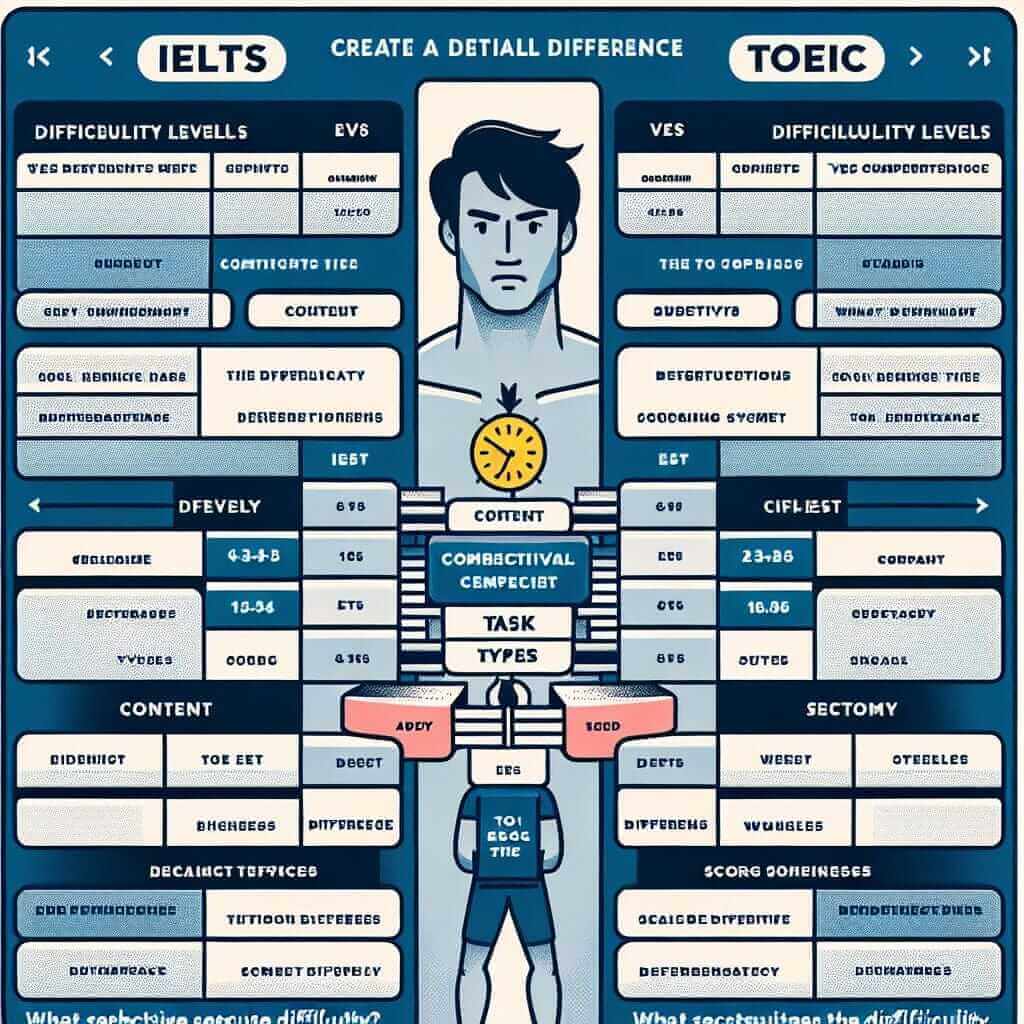As an IELTS instructor with over 20 years of experience, I often encounter students wondering about the differences between TOEIC and IELTS, particularly which test might be easier. This is a common and understandable question as both exams assess English language proficiency but cater to distinct purposes and audiences. Let’s delve deeper into a comprehensive comparison to help you understand which test aligns better with your needs and goals.
Understanding the Purpose and Structure of Each Test
IELTS (International English Language Testing System)
The IELTS is designed to assess the English language abilities of individuals who intend to study, work, or migrate to a country where English is the primary language of communication. The test evaluates proficiency across four key skills:
- Listening: This section assesses your ability to understand spoken English in various contexts, including academic lectures, social conversations, and news broadcasts.
- Reading: This section measures your comprehension of written English through passages from books, newspapers, magazines, and academic journals.
- Writing: You are required to write different types of texts, such as essays, letters, or reports, demonstrating your ability to articulate ideas clearly and cohesively.
- Speaking: This face-to-face interview assesses your fluency, pronunciation, grammar, vocabulary, and coherence in spoken English.
TOEIC (Test of English for International Communication)
The TOEIC, on the other hand, focuses specifically on assessing English language proficiency in workplace settings. It’s widely recognized by businesses and organizations worldwide as a reliable indicator of an individual’s ability to communicate effectively in international business environments. The TOEIC primarily comprises two sections:
- Listening and Reading: This section measures your ability to understand spoken and written English in workplace contexts, including meetings, presentations, emails, and reports.
- Speaking and Writing: This section evaluates your ability to communicate effectively in spoken and written English within professional settings, such as participating in meetings, making presentations, and writing business correspondence.
Comparing Difficulty: It’s Subjective but Here’s Why
Determining which test is inherently “easier” is subjective and depends on individual strengths, weaknesses, and familiarity with the specific format and content of each exam. However, some key factors contribute to the perceived difficulty level:
Content and Context
- IELTS: Covers a broader range of topics, from academic subjects to social issues, reflecting its focus on general English proficiency for academic and everyday life scenarios.
- TOEIC: Focuses solely on workplace contexts, with content revolving around business-related situations, vocabulary, and communication styles.
Task Types
- IELTS: Includes a wider variety of task types, such as multiple-choice questions, short-answer questions, sentence completion, summaries, essays, and face-to-face interviews.
- TOEIC: Primarily utilizes multiple-choice questions for both the Listening & Reading and Speaking & Writing sections.
Scoring System
Both tests utilize different scoring systems, making a direct comparison challenging. However, it’s generally acknowledged that achieving a higher band score in IELTS (e.g., 7.0 or above) can be perceived as more demanding than attaining a high score on the TOEIC (e.g., 900+).

So, Which Test Should You Choose?
Ultimately, the best test for you depends on your individual goals:
- Choose IELTS if: You’re aiming to study abroad, apply for immigration to an English-speaking country, or work in professions requiring a high level of general English proficiency.
- Choose TOEIC if: You want to enhance your employment prospects in international business environments, demonstrate your English communication skills to potential employers, or track your progress in workplace English proficiency.
Tips for Success, Regardless of the Test
No matter which test you choose, dedicated preparation is key:
- Familiarize Yourself with the Test Format: Understand the structure, timings, and question types for each section.
- Practice Regularly: Utilize practice tests and sample questions to become comfortable with the format and identify areas for improvement.
- Expand Your Vocabulary: Develop a strong vocabulary base, particularly in areas relevant to the test you choose.
- Focus on Time Management: Learn to pace yourself effectively during the test to ensure you can attempt all questions.
- Seek Guidance from Experienced Instructors: Consider taking a preparation course or working with a tutor to receive personalized feedback and guidance.
Remember, consistent effort and focused practice will significantly contribute to your success in either the IELTS or TOEIC. Choose the test that best aligns with your aspirations, and embark on your English language learning journey with confidence!